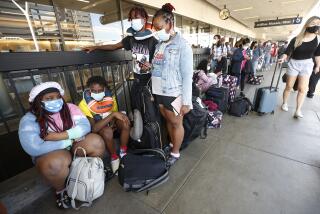The Newest Code Word in Air Travel Is <i> Sharing</i> : Airlines: Code-sharing agreements among carriers are giving passengers more flexibility in booking flights. But don’t forget to find out which carrier is responsible should problems occur.
- Share via
Let’s say you want to book a flight from Seattle to London on British Airways. But British Airways doesn’t fly Seattle-London. The carrier does, however, offer service from Chicago to London.
Not to worry. Thanks to a marketing venture between British Airways and United Airlines called code sharing, you can still book a flight on British Airways, with a slight adjustment. The first segment of the flight, Seattle to Chicago, will be on United, while the final leg, Chicago to London, is on British Airways.
Which carrier, British Airways or United, is responsible to you on such matters as refunds and lost or damaged baggage? What about denied-boarding compensation when overbooking is involved?
In this case, the carrier responsible is British Airways.
Code-sharing agreements stem from the desire of foreign airlines to tap the U.S. market and gain traffic to and from many points in this country without operating their own jets.
Similarly, American carriers can obtain comparable benefits in the foreign airline’s country.
The key item to remember on such “mixed flights” is that the airline you were ticketed on--British Airways, in this case--is the one ultimately responsible for most consumer-related problems.
To help consumers avoid confusion, airlines are required by the Department of Transportation to disclose at the time of ticket sales whether the flight will be on a different carrier than is indicated by the airline code shown on the ticket (airlines use identification codes--such as AA for American and QF for Qantas--on their tickets).
In the earlier example, the Seattle-London ticket would show the British Airways (BA) code, even though the first segment of the flight is on United.
These kinds of situations are cropping up at an increasing rate as U.S.-based carriers and foreign airlines implement code-sharing agreements with each other.
Code sharing among airlines, commonplace between major and regional carriers in the United States, has lately become more international in scope.
Travelers should be aware that baggage rules offered under code-sharing agreements between U.S.-based carriers and foreign airlines are governed by international regulations.
Under these agreements, flights between U.S. points (such as Seattle to Chicago on British Airways) are considered international rather than domestic. The same holds true if you’re flying, for example, between Sydney and Perth under a code-sharing agreement between American Airlines and Qantas.
Accordingly, passengers could get a maximum of $9.07 per pound ($20 per kilo) on lost or damaged checked-through luggage instead of the domestic rule in the United States calling for a maximum payment of $1,250 per passenger.
The international rules on overbooking, or denied-boarding compensation, are also applied in cases of U.S. and foreign airline code-sharing agreements.
The rules on smoking can be tricky when code sharing is involved.
Even though a domestic flight such as Seattle to Chicago may be considered “international,” smoking is still prohibited if the flight is less than six hours.
Conversely, if you are overseas, the general rule is that international regulations govern overbooking and smoking.
“The best bet is to remember that the country of the flight’s origin normally determines the rules, but the rules on baggage are international and therefore governed by the Warsaw Convention,” said Craig Ruess, district sales manager at LAX for Cathay Pacific, which has a code-sharing agreement with American Airlines on its Los Angeles-Hong Kong route.
Under code sharing, it’s possible to fly from LAX to Honolulu without smoking being permitted, then continue on to a point like Sydney or Hong Kong while being allowed to light up.
“In such a situation, we would try to put passengers who don’t smoke in a no-smoking seat for the whole route,” said Neil Wall, a Qantas executive in San Francisco.
But if you’re flying back to the United States, or on a flight within another country, you are still bound by the smoking rules on aircraft of that particular nation, even if your ticket shows the code of a U.S. carrier.
Cathay Pacific and American will expand their code-sharing agreement later this year, which will allow Cathay Pacific to use American’s codes on domestic flights between Los Angeles and San Francisco.
Meanwhile, American will be able to offer flights from Hong Kong, where it doesn’t have rights, to the United States.
More code sharing between airlines is expected as part of the increasing globalization of the travel industry, which includes assorted joint marketing agreements between airlines, hotels, car-rental companies and cruise lines.
In each case, travelers should find out who is offering the service and who is responsible to them for any problems connected to the service.
DOT approval of some of the code-sharing agreements has not gone without opposition. Carriers have argued that some agreements may reduce competition. Another criticism is that such agreements go against the rule of cabotage, which forbids foreign airlines from carrying passengers strictly within the United States.
The DOT says it is monitoring these code-sharing agreements closely to see that they don’t prove to be anti-competitive.
More to Read
Sign up for The Wild
We’ll help you find the best places to hike, bike and run, as well as the perfect silent spots for meditation and yoga.
You may occasionally receive promotional content from the Los Angeles Times.






